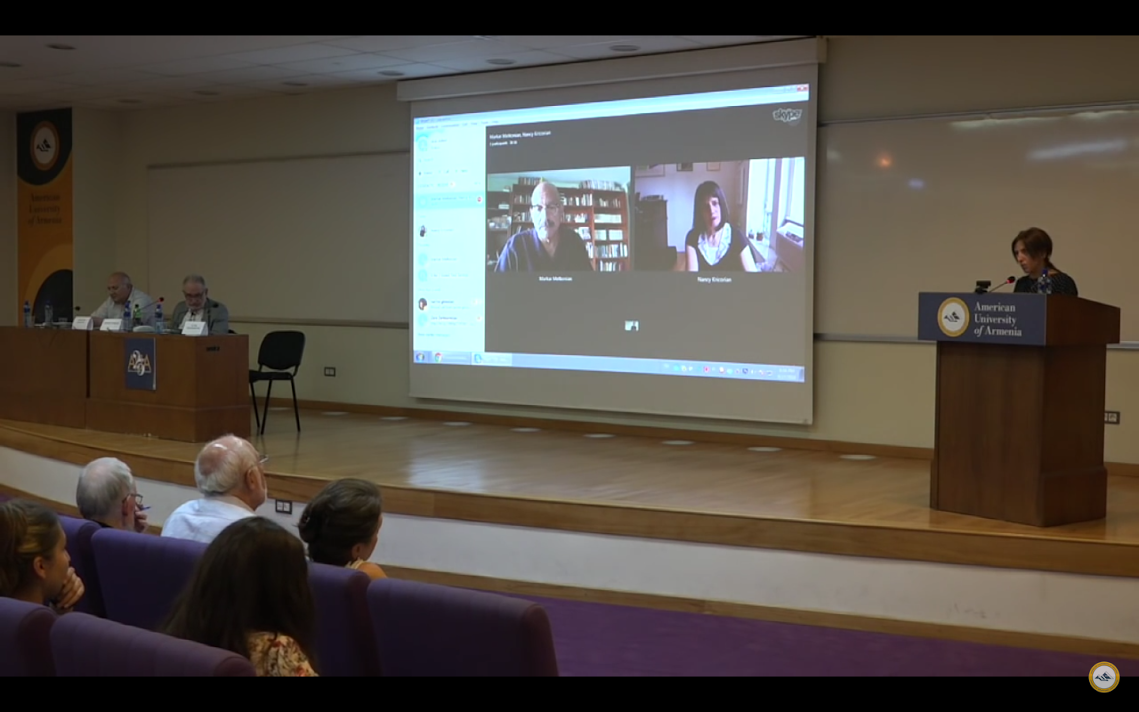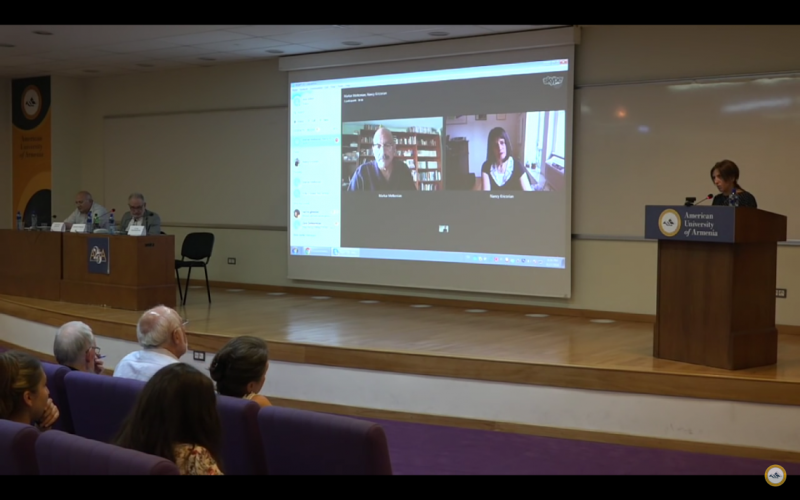
HETQ: How Not to Talk About Israel and Armenia
6 min readSource: http://hetq.am/eng/news/68962/how-not-to-talk-about-israel-and-armenia.html
By Melanie Nakashian
“Should Armenia be like Israel? If yes, then how? And what does it mean to be like Israel?”
This was the question up for discussion at the American University of Armenia (AUA) in Yerevan during the June 27 panel, ‘Parallels Between Armenia and Israel: Reflections on the Current Discourse in Armenia.’
As an Armenian-American who previously worked in Israel and now lives in Armenia, and will soon return to study in Israel, I obviously have my own answer to this question: absolutely not. Not only would it be unwise, it is straight-up impossible.
Mainstream Armenian media, on the other hand, say it would be a great idea – as do the Armenia-based academics on the panel.
But it seems to me that if academics are spouting the same misguided message as mainstream media, they’re not doing their jobs.
Two of the four panelists were academics from Armenia: Dr. Alvina Hovhannisyan, assistant professor at Yerevan State University (YSU) and Dr. Harutyun Marutyan, researcher at the National Academy of Sciences of Armenia and YSU visiting professor. The other two were Armenian-Americans joining via Skype: Dr. Markar Melkonian, a California-based writer and professor, and Nancy Kricorian, a New York-based writer and activist.
While Melkonian and Kricorian were well-versed in the realities of Israel that make it an unrealistic model for Armenia, the others demonstrated their lack of awareness and brushed off the fundamental differences between the two nations.
I and many others left AUA disappointed with the weak and ill-informed arguments of Marutyan and Hovhannisyan, as well as with the poor conduct of moderator and AUA Professor Gregory Areshian, who seemed to think he was also a panelist (“I am the only historian on this panel!”).
Others were annoyed that they had to hear about Palestine at all, as if it is possible to understand Israel without it, as if they wished the Americans would have kept their mouths shut so as not to expose the naiveté of their mythical illusion that Armenia could ever ‘be like Israel.’
Melkonian was the first to speak, pointing out two interrelated considerations that essentially illustrate the absurdity of the suggestion that Armenia can and should emulate Israel.
First, unlike Armenia, Israel is a colonial settler state. Those in Armenia who admire its cohesion and relative stability “ignore the fact that it is in part a result of institutionalized apartheid.”
Second, Israel is a “highly militarized garrison state.”While its Armenian admirers see it as a model of self-reliance, “it is hard to find a less independent country,” he explained, as it depends on billions of dollars from US taxpayers as well as other forms of support such as technology transfer, tax advantage and diplomatic immunity.
Melkonian argued that it is a positive thing that Armenia could never function as a garrison state, largely due to its location and poverty. “To advocate the pursuit of entirely unrealizable goals could be very dangerous for a small, impoverished nation like Armenia,” he concluded. “To venerate a regime widely associated with injustice does not help diplomacy; it does not help good relations with our most helpful neighbors or the pursuit of other proclaimed goals of Armenian diplomacy.”
A question from panelist Marutyan (unless it was rhetorical, though it did not seem to be) was the first sign that he knew very little about Israel: “Are there any racist laws in the State of Israel nowadays?”
Kricorian responded, pointing to Adalah Legal Center for Arab Minority Rights in Israel and its database of over 50 discriminatory laws – which she noted also affect Armenians.
Marutyan’s ignorance became crystal clear during his own talk focused on the memory of genocide in the structures of Armenian and Jewish identities. Referring to Israel’s official ‘Holocaust and Heroism Remembrance Day’ in contrast to Armenia’s ‘Armenian Genocide Remembrance Day,’ he attempted to prove that victimhood is less emphasized in the collective Jewish memory and proposed that Armenia rename its commemorative day to shift some focus onto the resistance that took place during the genocide.
In reality, in Israel, the holiday is referred to colloquially as Yom HaShoah, or Holocaust Remembrance Day. After living in Israel through two of those days, I think I would remember if there was any emphasis on the heroes. But I don’t.(And actually, Armenian resistance of Musa Daghis celebrated annually with the Musaler feast.)
Marutyan seemed unaware of the disgusting degree to which the Holocaust has become an industry, its true memory exploited for Israel’s political gain. Simply look at Prime Minister Benjamin Netanyahu’s Holocaust Remembrance Day speeches. For example, in 2013: “The murderous hatred against the Jews has not passed from the world, but it simply was replaced by murderous hatred against the Jewish state.” Again and again, this message is repeated.
By far, the most disappointing panelist was Hovhannisyan. (above photo) Upon hearing that she spent time in Israel and would speak as a “witness,” I expected to hear something worthwhile. Nope.
Her most problematic pointwas that Israel is “not militarized,” but rather, their army is “socialized” and integrated with educational programs.“It’s not isolated from the society… We can see [soldiers] all the time,” she reminisced.
Does she have any idea what ‘militarization’ means?! Let me Google that for you: it is “the process by which a society organizes itself for military conflict and violence.”
When Kricorian asked Hovhannisyanif she was aware of the discrimination faced by Armenians in the (ever-shrinking) Armenian Quarter of the Old City of Jerusalem, she responded by equalizing this discrimination – the racism of Zionism – with issues of class in Armenia.
Once a woman in the audience finished a monologue about how she, too, faces discrimination for wearing a miniskirt (so hey, apartheid’s gonna happen), she asked if Armenia could learn anything from Israel about corruption. Hovhannisyan yet again demonstrated her ignorance, noting that her “general impression” was that Israel is “free of corruption” or has a “less amount of corruption.”
Kricorian immediately chimed in: Sara Netanyahu, the Prime Minister’s wife, is about to be indicted for misuse of state funds – one of many examples of high profile cases of corruption in Israel.
Kricorian began her own talk by stating that it is not anti-Semitic to criticize Israeli government policy. She then presented her poem, ‘Letter to Palestine (With Armenian Proverbs)’ and spoke about why she, as an Armenian, feels parallels with the Jewish diasporabut also identifies with the Palestinian struggle and its marginalized narrative of dispossession and ethnic cleansing – the story that is not told.
She then recounted her experience in the diaspora, where she often hears aspirations to be like AIPAC (The American Israel Public Affairs Committee), the pro-Israel lobby with a frighteningly strong stranglehold on US politics. Kricorian also mentioned that as part of the Executive Committee of the Armenian Tree Project, which plants native trees on Armenian land, she hears erroneous comparisons to the Jewish National Fund (JNF), a “Zionist organization that plants non-native trees on confiscated Palestinian land.”
When Hovhannisyan paralleled the fact that Palestinians cannot return with the fact that Azerbaijanis cannot live in Nagorno-Karabakh, Kricorian noted that while the conflicts are different, such similarities are found in notion of the nation-state and the discrimination that stems from that, particularly in the current state of war.
One audience member, French student Sévane Poulain, felt that the most important point of the discussion came from Kricorian: criticism of Israel does not equate with anti-Semitism.
“It needed to be said. People seemed confused about that,” noted Poulain.“The teachers here need to develop their critical sense. They’re not thinking and they’re not questioning.”
Indeed, the message of the local academic half of the panel (and especially from so-called ‘moderator’Areshian), as well as from many in the audience who spoke up, essentially regurgitated that of mainstream media.
Particularly in recent months since April’s Four-Day War between Azerbaijan and Nagorno-Karabakh, the media’s message has been this: Armenians, like Jews, are blessed peoples who have undergone genocide, so now, living in a place with no natural resources and surrounded by enemies, Armenia, with the help of its diaspora, can and should follow the model of Israel – economically, militarily, and diplomatically.
Falling into this myth is basically like asking, “if they can do it, why can’t we?” – and then closing your ears when someone tells you why you can’t.When neither the people on the streets nor in academia are aware of basic facts of Israel-Palestine, superficial similarities such as ethnic cleansing and territorial dispute (which Melkonian explained are not distinctive but rather quite common throughout the world) seem to be enough to support this faulty analysis.
This discourse on emulating Israel tends to arise in media at strategic times. According to ArmComedy journalist Sergey Sargsyan, “the Israeli model comes up every time things get tense and heated on the border.”
Local activist Anna believes the media’s discourse comes from the “strong nationalist and ruling power’s discourse in Armenia” aiming to promote military-related undertakings “which will be justified by the mystical vision of being like Israel.” Interestingly, she noted that the same discourse of becoming like Israel is also present in Azerbaijan. Shahnazaryan also suggested that those who believe Armenia should aim to be like Israel might as well consider emulating Turkey or Azerbaijan instead.
Though I was disappointed with the event, as someone who cares deeply about both Armenia and Israel-Palestine, I am still grateful for the conversation it sparked. I would love to see AUA organize more discussions – this time with Jewish Israelis and Palestinians also on the panel (and a better moderator, of course) – addressing the following questions:
What are the differences and similarities between Palestinians and Armenians?
What’s going on with the Armenians in Israel and Palestine?
What can Armenians learn from the Palestinian struggle?
What can Armenians learn from Israelis who speak out about their army service?
What can Armenians learn from the experiences of Jewish and Palestinian peace activists in Israel, Palestine and beyond? Their strategies? Their challenges?
What can Armenians learn from local Israeli and Palestinian journalists attempting to counter the way that their situation is portrayed by international media?
These questions – the ones that mainstream media will never address – are the ones that should be asked.

